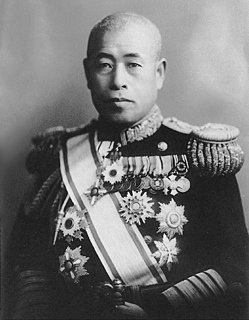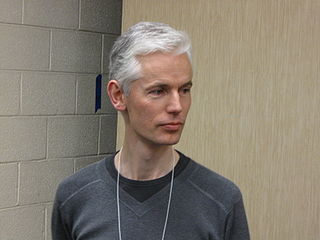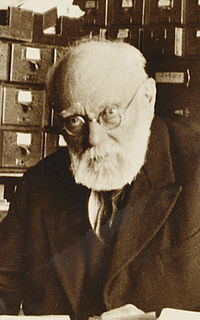Top 88 Armchair Quotes & Sayings - Page 2
Explore popular Armchair quotes.
Last updated on December 4, 2024.
He sits in an old armchair in the corner covered with bits of blankets and a bucket behind the chair that stinks enough to make you sick and when you look at that old man in the dark corner you want to get a hose with hot water and strip him and wash him down and give him a big feed of rashers and eggs and mashed potatoes with loads of butter and salt and onions.I want to take the man from the Boer War and the pile of rags in the bed and put them in a big sunny house in the country with birds chirping away outside the window and a stream gurgling.
Most people, when they move, well they just move depending on whatever's around them. At this very moment, as I am writing, Constitution the cat is going by with her tummy dragging close to the floor. This cat has absolutely nothing constructive to do in life and still she is heading toward something, probably an armchair.
I didn't read a book until I was 31 years old when I was diagnosed with dyslexia. Books terrified me. They made me nervous. Now I know you can travel to the bottom of the ocean or to outer space or anywhere in between without leaving your armchair, and I'm so, so sorry I couldn't read when I was younger.
The experimentalists think that we can only get at our concepts by way of empirical investigation, while the armchair philosophers think that we can skip the experiments and figure things out from our armchairs. What they have in common, however, is regarding our concepts as the targets of philosophical theorising, and I just don't think that, in the vast majority of cases, the subject matter of philosophy has our concepts as its target.
Should hostilities once break out between Japan and the United States, it is not enough that we take Guam and the Philippines, nor even Hawaii and San Francisco. To make victory certain, we would have to march into Washington and dictate the terms of peace in the White House. I wonder if our politicians, among whom armchair arguments about war are being glibly bandied about in the name of state politics, have confidence as to the final outcome and are prepared to make the necessary sacrifices.
Sherlock Holmes took his bottle from the corner of the mantel-piece, and his hypodermic syringe from its neat morocco case. With his long, white, nervous fingers he adjusted the delicate needle, and rolled back his left shirt-cuff. For some little time his eyes rested thoughtfully upon the sinewy forearm and wrist, all dotted and scarred with innumerable puncture-marks. Finally, he thrust the sharp point home, pressed down the tiny piston, and sank back into the velvet-lined armchair with a long sigh of satisfaction.
One man has discovered that by running there is no need to meditate, just by running meditation happens. He must be absolutely body oriented. Nobody has ever thought that by running meditation is possible - but I know, I used to love running myself. It happens. If you go on running, if you run fast, thinking stops, because thinking cannot possibly continue when you are running very fast. For thinking an easy chair is needed, that's why we call thinkers armchair philosophers; they sit and relax in a chair, the body completely relaxed, then the whole energy moves into the mind.
I have now and again tried to imagine the perfect environment, the ideal conditions for reading: A worn leather armchair on a rainy night? A hammock in a freshly mown backyard? A verandah overlooking the summer sea? Good choices, every one. But I have no doubt that they are all merely displacements, sentimental attempts to replicate the warmth and snugness of my mother's lap.
M. J. Putney has created true magic with this book, the kind that comes when you curl up in a comfortable armchair and let the story take your imagination away. Come visit an enchanted eighteenth-century England and meet two desperate lovers caught in the web of a sinister lord with great magical power. Romantic and lyrical, this tale will fill your reading time with pleasure. I loved it.
She sits in her usual ample armchair, with piles of books and unopened magazines around her. She sips cautiously from the mug of weak herb tea which is now her substitute for coffee. At one time she thought that she could not live without coffee, but it turned out that it is really the warm large mug she wants in her hands, that is the aid to thought or whatever it is she practices through the procession of hours, or of days.
Holding this book in your hand, sinking back in your soft armchair, you will say to yourself: perhaps it will amuse me. And after you have read this story of great misfortunes, you will no doubt dine well, blaming the author for your own insensitivity, accusing him of wild exaggeration and flights of fancy. But rest assured: this tragedy is not a fiction. All is true.
I used to be a writer with superstitions worthy of a professional baseball player: I needed a certain desk chair and a certain armchair and a certain desk arrangement, and I could only get really useful work done between 8 P.M. and 3 A.M. Then I started to move, and I couldn't bring my chairs with me.
At the other end of the spectrum is, for example, graph theory, where the basic object, a graph, can be immediately comprehended. One will not get anywhere in graph theory by sitting in an armchair and trying to understand graphs better. Neither is it particularly necessary to read much of the literature before tackling a problem: it is of course helpful to be aware of some of the most important techniques, but the interesting problems tend to be open precisely because the established techniques cannot easily be applied.
It is my dream to create an art which is filled with balance, purity and calmness, freed from a subject matter that is disconcerting or too attention-seeking. In my paintings, I wish to create a spiritual remedy, similar to a comfortable armchair which provides rest from physical expectation for the spiritually working, the businessman as well as the artist.
The kind of approach I take is different from much of experimental philosophy. Although the experimental philosophers and I are certainly in agreement about the relevance of empirical work to philosophy, a good deal of their work is devoted to understanding features of our folk concepts, and in this respect, at least, I see them as making the same mistake as those armchair philosophers who are interested in conceptual analysis.
I am concerned about epistemic normativity, and I don't think that it is just a hangover from a priori and armchair approaches. Some ways of forming beliefs are better than others, and epistemologists of all stripes, I believe, have a legitimate interest in addressing the issue of what makes some of these ways better than others.
I said that he was my superior in observation and deduction. If the art of the detective began and ended in reasoning from an armchair, my brother would be the greatest criminal agent that ever lived. But he has no ambition and no energy. He will not even go out of his way to verify his own solutions, and would rather be considered wrong than take the trouble to prove himself right.
My take is that there's two ways to approach history. You sit in your armchair and you watch it on the news and you return to your PlayStation. Or you get out in the streets and you make it. Like, when those Supreme Court justices, you know, legalize desegregation, it wasn't due to their infinite wisdom. It's because people whose names you do not read about in history books, people whose faces you will never see, were the ones who struggled and sacrificed, sometimes gave their lives, to make this country a more equal one. When, it's like those people don't make history, it's us.
Philosophers and psychologists have long puzzled over the question of how we know as much as we do despite our limited experiences. One way is to see how children learn. Another example is consciousness. The concept is usually explored by armchair academics. Looking at kids expands our conceptions of consciousness.
Nicknamed 'Mad-Dog Mattis' by his men, he was a command warrior in the old George Patton mode. He wasn't an armchair general by any definition of that much-maligned term. If a Marine re-upped at a location where he was present, he would personally go to that Marine and thank him or her for rejoining.
It started becoming clear to me how one might have views about the nature of mind and of knowledge which are empirically informed. This way of thinking about philosophical theorizing makes sense of how philosophy might be a legitimate intellectual activity, in a way that a good deal of the armchair philosophy, I believe, cannot.
I've never conceptualized much of what I write about. Maybe, once I'm onto something, I'll conceptualize a finished record. I want the songs to tie together and make sense together. I'm not like, "Oh, I want to explore this idea." That's just not how the creative process works for me. It's more like something strikes me, or finds me, and then I wrestle with it after that. I don't sit back in my armchair, like, "What kind of philosophy can I explore today?"
Internalist approaches to epistemology, I believe, have a great deal of intuitive appeal. Internalists believe that the features in virtue of which a belief is justified must somehow be internal to the agent. On some views, this amounts to the claim that these features must be accessible to introspection and armchair reflection. On others, it amounts only to the claim that they must be mental features.
Epistemology now flourishes with various complementary approaches. This includes formal epistemology, experimental philosophy, cognitive science and psychology, including relevant brain science, and other philosophical subfields, such as metaphysics, action theory, language, and mind. It is not as though all questions of armchair, traditional epistemology are already settled conclusively, with unanimity or even consensus. We still need to reason our way together to a better view of those issues.
Must you go? I was rather hoping you'd stay and be a ministering angel, but if you must go, you must." "I'll stay," Will said a bit crossly, and threw himself down in the armchair Tessa had just vacated. "I can minister angelically." "None too convincingly. And you're not as pretty to look at as Tessa is," Jem said, closing his eyes as he leaned back against the pillow. "How rude. Many who have gazed upon me have compared the experience to gazing at the radiance of the sun." Jem still had his eyes closed. "If they mean it gives you a headache, they aren't wrong.
O' beautiful for spacious skies
But now those skies are threatening
They're beating plowshares into swords
For this tired old man that we elected king
Armchair warriors often fail
And we've been poisoned by these fairy tales
The lawyers clean up all details
Since daddy had to lie
But I know a place where we can go
And wash away this sin
We'll sit and watch the clouds roll by
And the tall grass wave in the wind
Just lay your head back on the ground
And let your hair spill all around me
Offer up your best defence
But this is the end
This is the end of the innocence






















